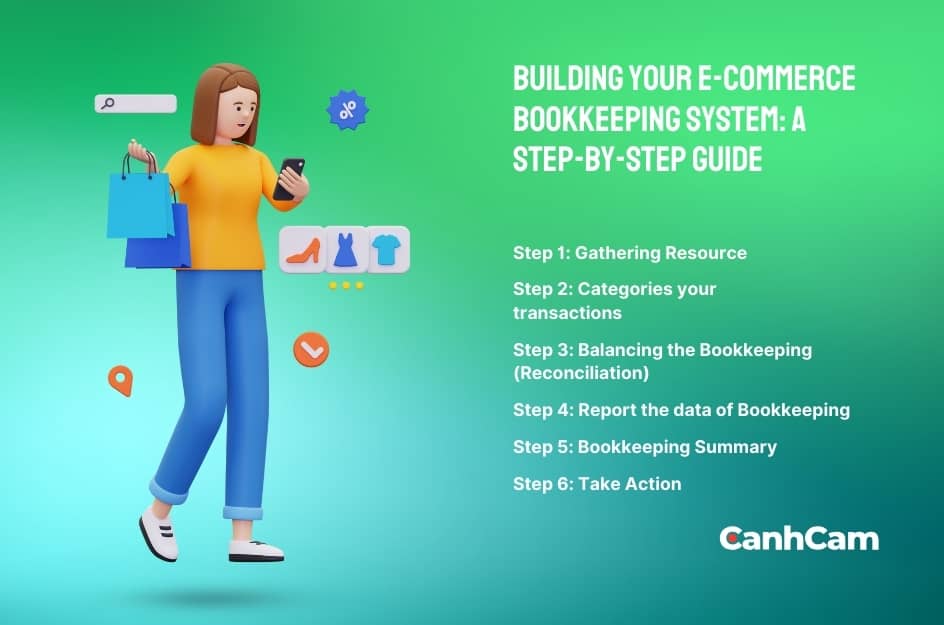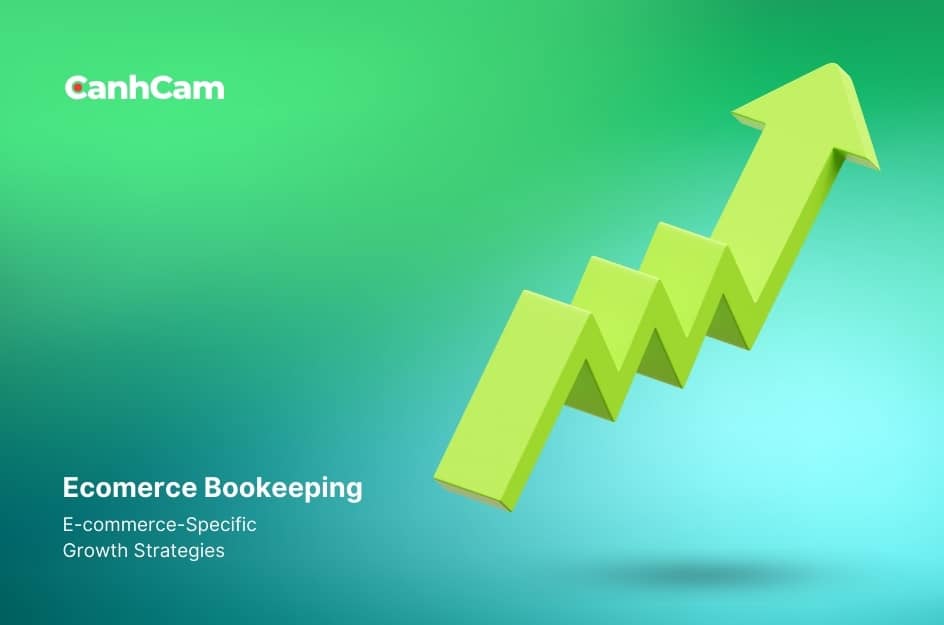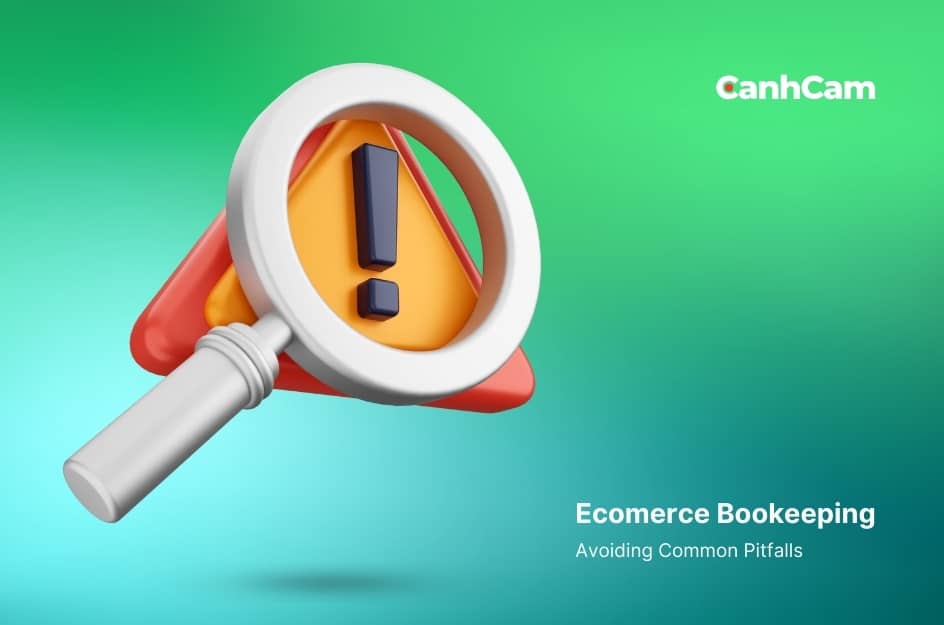This guide explains how an ecommerce accountant can help your online business flourish. Ecommerce accountants specialize in managing the financial aspects of online stores. They can help you with tasks like:
- Differences between ecommerce & business accounting?
- When should you hire an ecommerce accountant?
- What should Ecommerce business owners pay attention to?
- Your new ecommerce accountant - streamlining business finances
- How to choose the ecommerce accounting software?
- ...
By working with an ecommerce accountant, you can gain valuable insights into your business's financial health. This allows you to make informed decisions that will lead to long-term success.
What is an Ecommerce Accountant?
An ecommerce accountant is a financial specialist who helps online businesses manage their money. They track all the income and expenses of your business, including sales, purchases, salaries you pay (payroll), and other costs (operating expenses).
This includes the cost of the products you sell (cost of goods sold) and the money you spend to acquire new customers (customer acquisition costs).

Think of them as a specialized version of a small business accountant, with an in-depth understanding of the unique financial landscape of ecommerce. They go beyond basic bookkeeping, providing a comprehensive financial overview to help you make informed decisions and achieve your business goals.
Here's a closer look at how an ecommerce accountant streamlines your finances and fuels growth:
- Transaction Tracking: Every click and purchase on your online store translates to financial data. An ecommerce accountant meticulously records and categorizes each sale, expense, and processing fee, ensuring a clear picture of your cash flow.
- Order Management: Purchase orders (what you buy from suppliers) and sales orders (what you sell to customers) form the backbone of your ecommerce transactions. Your accountant ensures these orders are accurate and documented, preventing confusion and potential losses.
- Debts and Receivables: An ecommerce accountant keeps a close eye on your accounts payable (money you owe to vendors) and accounts receivable (money customers owe you). This helps you manage your cash flow effectively and avoid late payments or bad debts.
- Cost Analysis: Understanding your true product cost is crucial for setting profitable prices. Ecommerce accountants factor in not just the base product price, but also shipping costs, storage fees, payment processing charges, and any other expenses directly tied to selling your products. This comprehensive cost of goods sold (COGS) analysis helps you price competitively and maximize your profit margins.
- Tax Compliance: Ecommerce tax regulations can be complex, especially when dealing with sales across different states. An ecommerce accountant navigates these complexities, ensuring you collect and pay the correct sales tax based on your location and your customers' locations. They help you avoid costly tax penalties and fines, keeping you on the right side of the law.
What Are the Differences Between eCommerce Accounting & Business Accounting?
Running an online store involves a unique set of financial considerations compared to a traditional brick-and-mortar business. That's where an ecommerce accountant comes in. They specialize in handling the specific challenges of online commerce, ensuring your finances are accurate and optimized. Here's a breakdown of the key differences between ecommerce and business accounting:
- High Volume of Transactions: Ecommerce businesses often generate a large number of sales, each requiring meticulous recording. Ecommerce accountants understand efficient methods to manage this high transaction volume.
- Inventory Management & COGS: Ecommerce requires close attention to inventory levels and costs. Ecommerce accountants ensure accurate cost of goods sold (COGS) calculations, reflecting the true profitability of your online store.
- Complex Data & Digital Payments: Ecommerce transactions involve various platforms and digital payment methods. Ecommerce accountants can navigate this complexity, reconciling data from different sources and ensuring accurate financial reporting.
- Fraud Detection: Ecommerce is susceptible to fraud. Ecommerce accountants have expertise in identifying and preventing fraudulent transactions and protecting your business finances.
- Revenue Recognition: Knowing when to recognize revenue from online sales can be tricky. Ecommerce accountants understand the specific rules for ecommerce revenue recognition, ensuring your financial statements are compliant.
- Chart of Accounts: Ecommerce transactions require specific categories not typically found in traditional businesses. Ecommerce accountants can create a customized chart of accounts to accurately categorize your online sales and expenses.
- Refunds & Returns: Managing online refunds and returns requires specific accounting practices. Ecommerce accountants understand how to handle these situations efficiently and ensure accurate financial records.
- Omnichannel Factors: Many online businesses sell across multiple channels. Ecommerce accountants can handle the complexities of omnichannel sales, ensuring your finances reflect all sales platforms accurately.
Visit our service: Best Web Design Melbourne
When Should You Hire an eCommerce Accountant?
An ecommerce accountant can streamline your finances and free you up to focus on what matters most - growing your sales. Here are some signs it's time to hire an ecommerce accountant:
- Rapid Growth: As your sales increase, so do your financial complexities. An accountant can manage cash flow, track expenses, and ensure accurate financial records. This is crucial for securing future loans or attracting investors.
- Bookkeeping Burden: Are you spending more time on bookkeeping than growing your business? An accountant can handle daily tasks like recording transactions and bank reconciliations. This frees you up for marketing, product development, and other strategic areas.
- Tax Time Trouble: Tax filing for ecommerce businesses can be tricky. An accountant ensures your taxes are filed correctly and on time, and helps you claim all eligible deductions to minimize your tax burden.
- Cash Flow Concerns: Healthy cash flow is essential for any business. An accountant can create budgets, track expenses, and forecast revenue to help you manage cash flow effectively. They can also identify areas for cost savings and profit improvement.
- Inventory Woes: Effective inventory management is critical in ecommerce. An accountant can assist with tracking costs, identifying slow-moving items, and calculating the cost of goods sold.
- Considering Outsourcing: Outsourcing can be beneficial for cost reduction and time savings, but it also adds financial complexities. An accountant can help navigate these complexities, like managing invoices and tracking outsourced expenses.
What Should Ecommerce Business Owners Pay Attention To?
An ecommerce accountant can help you understand and manage these important financial aspects of your business:
- Cash Flow: This refers to the movement of money in and out of your business. Healthy cash flow ensures you have enough to cover expenses and avoid debt.
- Gross Profit: This is your total revenue minus the cost of the goods you sell. It shows your profit before accounting for other business expenses.
- Gross Margin: This metric expresses your gross profit as a percentage of your total revenue. It helps you understand profitability relative to your sales.
- Balance Sheet: This snapshot of your business finances at a specific point shows your assets (what you own), liabilities (what you owe), and shareholder equity.
- Profit and Loss (P&L) Statement: This report tracks your income and expenses over a period. A positive number indicates a profit, while a negative number shows a loss.
Your New Ecommerce Accountant: Streamlining Business Finances
Need help managing your growing online store's finances? Here's what they can do for your business, at each stage of its journey:
1. Under $100,000 in Revenue:
- Get started on the right foot: A general tax accountant will ensure your business is set up correctly and compliant with tax regulations.
- Essential tasks: Help with business incorporation, setting up cloud accounting software, and filing your annual tax returns.
2. Reaching $100,000+ in Revenue:
- Level up your accounting team: Consider hiring a freelance accountant or a full-service accounting firm, along with a bookkeeper.
- Maintaining financial health: Tasks include bookkeeping upkeep, sales tax filing, inventory management, basic financial reporting, payroll processing, and contractor payments.
- Avoid costly mistakes: Don't delegate bookkeeping to a non-certified virtual assistant. This can lead to errors and higher tax costs.
3. Reaching $1 Million+ in Revenue:
- Strategic financial guidance: While some may consider expensive solutions like an ERP system or a full-time CFO, most businesses can thrive with Xero or QuickBooks until reaching much higher revenue levels.
- Cost-effective alternative: Partner with an accounting firm offering virtual CFO services. This provides strategic financial advice on a part-time basis, saving you significant costs.
- Advanced financial tasks: Inventory forecasting, cash flow projections, setting financial goals, creating financial dashboards, and in-depth analysis become crucial.
- Time to specialize: Consider switching to an ecommerce accounting firm for their niche expertise. A generalist firm might miss important details specific to online businesses.
4. Reaching $25 Million+ in Revenue:
- Building your in-house team: Hiring a full-time financial controller becomes essential. They'll oversee your financial strategy, and budgets, and manage the entire accounting team.

How to Choose the Ecommerce Accounting Software?
Picking the right ecommerce accounting software is crucial for your online store's success. Here's a guide to help you navigate your options:
Seamless Integrations: Ensure the software connects with your existing ecommerce platform (like Shopify or Amazon). This automates data transfer, keeps inventory accurate, and simplifies tax filing.
Room to Grow: As your business expands, your accounting needs will evolve. Look for software with flexible plans that allow you to upgrade as your needs grow.
Features to Save Time: Consider features that streamline your workload, such as:
- Sending invoices
- Tracking expenses
- Calculating sales tax
- Managing payroll (if needed)
- Handling multiple currencies
Easy to Use: Learning new software shouldn't be a hassle. Choose something with a clear interface and intuitive design that's easy for you and your team to pick up.
Reliable Support: When you need help, strong customer service is essential. Look for software with options like live chat, phone support, and a comprehensive knowledge base.
Top-Notch Security: Your financial data is sensitive. Make sure the software prioritizes security with features like two-factor authentication, data encryption, and regular backups.
Read Reviews: See what other ecommerce businesses say! Platforms like G2 or the Shopify App Store offer valuable insights into the software's pros and cons.
Read more: Ecommerce Copywriting - How to Boost Sales by Copywriting

Pros and Cons of Outsourcing Your Ecommerce Accounting
When it comes to the question of getting external accounting help vs. doing it in-house, there are a few pros and cons to discuss. For e-commerce businesses that don’t require someone working on your books full-time, it’s typically much more cost-effective to outsource rather than have a dedicated employee.
The next major benefit of outsourcing your e-commerce accounting is the expertise. Professionals tend to have a wider range of experience and can provide a higher standard of work and more nuanced insights into your business. This then allows you to use your time and internal resources where it makes the most difference.
Despite the many advantages, there are some disadvantages as well. Outsourcing means you have to give away some control. It can be difficult to find a professional that you can trust with the financial health of your business. Secondly, it can be difficult to maintain communication with an external accounting professional and even more difficult if they’re from a different location.

Frequently Asked Questions (FAQs)
1. Do you need an accountant for ecommerce?
The accountants in ecommerce are the ones who play a vital role in managing the online businesses. They are in charge of managing sales data, designing account systems and combining software with e-commerce platforms. Moreover, they can help you with taxes, and revenue tracking, and be an advisor in marketing.
2. How does ecommerce accounting work?
Ecommerce accounting includes the management of the payments made via credit cards or digital payment methods.
In contrast to typical retail outlets, e-commerce companies must constantly monitor and reconcile sales, returns, refunds, and payments from different sources, such as PayPal and Stripe.
Conclusion:
Effective accounting is the cornerstone of any successful E-commerce business. It's the key to financial clarity, informed decision-making, and sustainable growth.
By mastering inventory management, implementing essential accounting tasks, and utilizing the right tools and resources, you'll transform your online store into a financial powerhouse.
Remember, good accounting isn't just about numbers – it's the compass that guides you toward achieving your E-commerce dreams.

